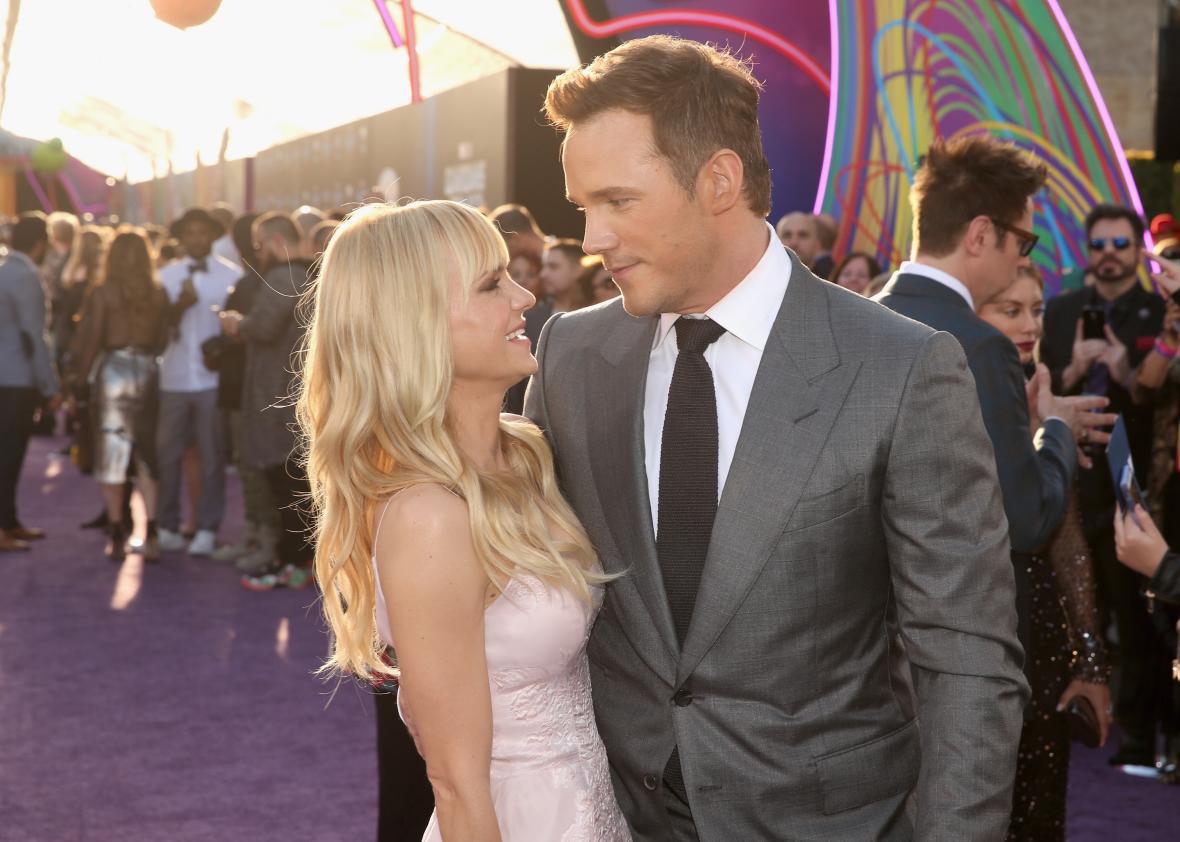When a celebrity couple breaks up, of course the decent thing to do would be to pay no mind, to “respect the couple’s privacy at this difficult time.” But when we’ve spent years watching them on red carpets, reading about their relationship in magazines, liking their cutesy Instagram posts, and gobbling up their anecdotes on talk shows, the impulse to react personally is hard to subdue. And in the case of Anna Faris and Chris Pratt, who announced their separation on Sunday, the overwhelming reaction is one of sadness. These two weren’t an Angie and Brad–style tabloid staple, nor were they a flavor of the week, destined to burn out before their next press tour. Instead, they seemed to be that rare thing—a low-key (for Hollywood), actually-likes-each-other couple that could be in it for the long haul.
Their statement about the separation, which they both released on social media, is shattering in its plain-spokenness (“We tried hard for a long time, and we’re really disappointed”) and offers a hint at the “real deal” factor that made their union so compelling. Of course, the idea that a casual observer of any marriage, let alone a celebrity one from a distance, could have any idea what it’s like on the inside is flawed, yet Farris and Pratt had that spark of authenticity that made people root for them. Part of that charm has its origins in the story of how Faris and Pratt got together about a decade ago, on the set of a now-forgotten romantic comedy, when she was the more famous of the pair. (She was married at the time but began dating Pratt when that relationship ended, and they got engaged and married soon after. The two had a son together in 2012.)
When they met, Pratt had appeared on TV shows like Everwood and The O.C., but Faris had made a name for herself as the ditzy blonde in the Scary Movie franchise, headlined a few movies on her own, and was poised to become the next big thing. In a 2011 profile, the New Yorker called Faris “Hollywood’s most original comic actress,” and though she’s held several starring roles since then, including one on the CBS sitcom Mom, her career didn’t end up taking the A-list, it-girl trajectory such a writeup hopes to foretell. But during the same period, Pratt’s did. He parlayed a beloved ensemble role in Parks & Recreation to landing lead parts in blockbusters like Jurassic World and Guardians of the Galaxy, and along the way, he went from beer-bellied goof to hard-bodied heartthrob. This seemed to add another dimension to their relationship—she had her success, now he’ll have his. But viewed in hindsight, it now sounds like both typical Hollywood and high school all over again: A guy goes away to summer soccer camp, has a growth spurt, and gets cool. When he comes back, he breaks up with his old girlfriend and starts hanging out with the popular kids.
Of course, this is all speculation, and Pratt’s career hasn’t been without its setbacks. (Remember Passengers?) But part of what feels heartbreaking here lies in the way this breakup resonates with Hollywood’s tradition of treating men and women very differently, which gives context to Pratt’s ascent. Faris’s career may be chugging along beside it, but her lack of astronomical success ends up looking like she got the short end of the stick. Their ages further flesh out this reading: At 40, Faris might be considered past her prime by Hollywood standards, whereas Pratt, slightly younger at 38, is just coming into his and can look forward to another decade or more of lead roles. Faris will be fine—she’s got that CBS money—but where’s her franchise?
Having a career in the public eye exerts an unmeasurable toll on relationships, and Faris herself spoke recently to People about the pressure she and Pratt faced. “I don’t think that’s something, when you’re an actor, that you’re prepared for,” she said. “There are two different roles that you play—the one on-camera and the one in public. That’s the tricky part.” We can never know what really broke the two up, but the meta narrative is enough to make you give up on love—and hope for women in Hollywood—completely.
